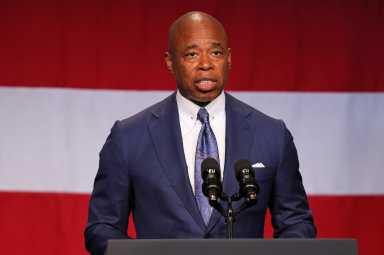Listeners:
Top listeners:
-
play_arrow
RadioJLR Just Press Play

Bermuda
National Security Minister, Michael Weeks, says the short-term goals of the National Violence Reduction Strategy Blueprint have already been achieved as the authorities put measures in place to combat gang violence.
Weeks said the strategy, which existed after a two-day consultative workshop with public and private stakeholders, came together to “brainstorm the issue of violence in our community and generate possible solutions.”
“Exploration of what is working and any gaps found in helping services was at the forefront of our mission,“ he said.
Weeks thanked all stakeholders for their valuable contributions towards this national strategy.
“Bermuda, we are at a crossroads, where the scourge of violence threatens the very fabric of our island home; undermining peace, safety, security, and ultimately, prosperity for all,“ he said.
Weeks laid the 26-page document in Parliament, saying that some medium-term goals under the project are already underway.
“The long-term goals speak to the deeper mission of addressing the root causes of violence, transforming perceptions, reshaping behaviours and shifting cultural norms so that peace and opportunity become the standard for our communities,“ he said.
Weeks said that the short-term goals, which were expected to be built up over six months, involved creating a “governance architecture“ that featured the steering committee, Inter-Agency Gang Enforcement Team, and Inter-Agency Community Response team.
Among the medium-term goals is the use of advanced technology to monitor gang activity for six months and two years, with the government assuring that civil liberties will be protected.
The NVRS blueprint’s long-term goals, which place greater emphasis on parole and reintegration, including creating safe houses for those leaving gangs and offering specialised support for parolees, are expected to be achieved two years after its launch.
CARICOM
The Guyana-based Caribbean Community (CARICOM) Secretariat said that four member countries, Barbados, Belize, Dominica, and St Vincent and the Grenadines, are on track to implement free movement among themselves from Oct. 1.
“By implementing the full free movement regime, these four countries have agreed to grant their nationals the right to enter, leave and re-enter, move freely, reside, work and remain indefinitely in the receiving member state, without the need for a work or residency permit,“ the Secretariat said.
These countries’ nationals will also be able to access emergency and primary healthcare, as well as public primary and secondary education, within the means of the receiving member state.
The move by these four Caribbean countries is in keeping with a decision by CARICOM leaders at the summit held in Jamaica in July and forms part of the overall objective of the CARICOM Single Market and Economy (CSME), which aims to allow for the free movement of goods, skills, labor, and services across the member countries.
The CARICOM Secretariat said that representatives from the four member states have been working together to ensure the required measures to support the full free movement of their nationals will be undertaken.
“This free movement arrangement falls within the new Enhanced Co-operation Chapter of the Revised Treaty of Chaguaramas.“
“Under that Chapter, the Conference of CARICOM heads can allow groups of at least three member states to seek to advance integration among themselves where the conference agrees that the targeted objectives cannot be attained within a reasonable period by the community as a whole.”
The Secretariat said this type of free movement expands what is offered under the CSME and is available to all CARICOM nationals of the participating four countries.
Grenada
The Investment Migration Agency of Grenada (IMA Grenada) said it has formally approved and adopted its anti-money laundering and countering the financing of terrorism (AML/CFT) policy and procedure, aligning with European Union requirements and other leading international standards.
“Implementing this policy is a clear demonstration of our proactive approach to governance and risk management.”
“It strengthens our credibility with international partners and assures investors that Grenada’s program operates to the highest levels of accountability.”
IMA’s CEO Thomas Anthony said the company remains fully committed to protecting Grenada’s reputation, safeguarding its international partners, and contributing to the global fight against financial crime.
The IMA Grenada controls the country’s Citizenship by Investment (CBI) program, under which foreign investors receive citizenship in return for making substantial investments in the country’s socio-economic development.
It said the approval and adoption of the AML/CFT emphasized the commitment to preserving the integrity of CBI and protecting stakeholders from the risks associated with money laundering and terrorist financing.
Guyana
ExxonMobil Guyana announced recently that the long-awaited Guyana Technical Training College Inc. (GTTCI) will welcome its first set of fully trained local students in October 2025.
The move marks a milestone in the country’s local content and workforce development strategy.
The GTTCI’s oil and gas training facilities, located at Port Mourant, Berbice, are a collaborative project of the Guyana government and major companies in the sector, including ExxonMobil and SBM Offshore. President Irfaan Ali previously stated that they are expected to be completed in October 2026.
ExxonMobil also marked a breakthrough in local industrial capacity this year with the start of in-country fabrication at the Vreed-en-Hoop Shore Base Inc. (VEHSI), where quad joints and Pipeline End Terminations (PLETs) are being produced for offshore projects.
As of mid-2025, more than 6,200 Guyanese are employed by ExxonMobil Guyana and its contractors, representing approximately 70% of the oil and gas workforce. This workforce includes one in three employees, who are Guyanese women, and approximately 1,800 Guyanese working offshore.
According to the ExxonMobil press statement, over 370,000 hours of training – leadership, technical, professional, health, safety, and security – have been delivered to build local capability.
“We are proud of the progress we’ve made in building local talent,“ said Alistair Routledge, President of ExxonMobil Guyana. “Seeing more Guyanese take on key roles in the oil‐and-gas industry is a clear sign that our commitment to capacity building is working.”
Haiti
The United Nations Secretary General, Antonio Guterres, has condemned the murders of at least 40 people over a weekend, during a string of brutal incidents and ongoing gang violence in the CARICOM country.
In a statement, Guterres expressed “heartfelt condolences to the victims’ families and urged Haitian authorities to pursue justice.“
“The secretary-general is alarmed by the levels of violence rocking Haiti,“ said Stéphane Dujarric, the UN spokesman.
“He calls on member states to expedite support for the multi-national security support mission to assist the Haitian National Police.”
Guterres recently addressed the UN Security Council, painting a grim picture of Haiti’s unravelling state.
With six million people needing aid and 1.3 million displaced, Haiti’s humanitarian crisis is deepening.
Guterres is calling on member states to increase efforts to strengthen the Kenya-led Multi-national Security Support Mission (MSS) by providing the necessary logistics, personnel, and funding to effectively support the Haitian National Police in combating gang violence in Haiti.
The US and Panama have presented a resolution to the UN Security Council. However, it appears that China and Russia are hesitant to support the resolution aimed at creating a “gang suppression force“ in Haiti to deal with the gangs that have been designated foreign terrorist organisations and global terrorists by the State Department.
The White House considers the situation in Haiti a threat to its national security and has, therefore, decided to refer the matter to the UN.
The US has the support of France and the United Kingdom, but needs that of China and Russia for the resolution to be approved.
Political observers say the difficulty is that China and Russia disagree with President Donald Trump on other political issues. China questions the tariffs imposed on its exports, and Russia opposes the military support and the White House’s threat of tougher sanctions if it does not make peace with Ukraine.
Compiled by Devika Ragoonanan
Written by: Adm
Similar posts
© 2025. All Rights Reserved by Radio-JLR


